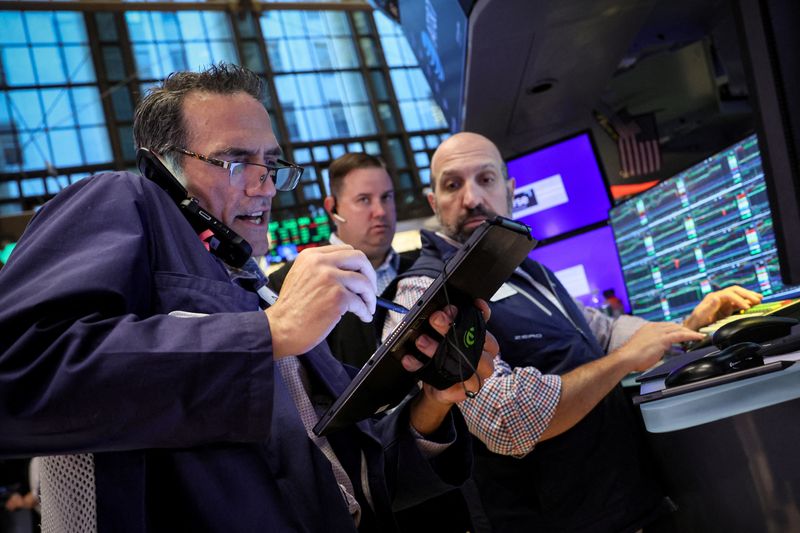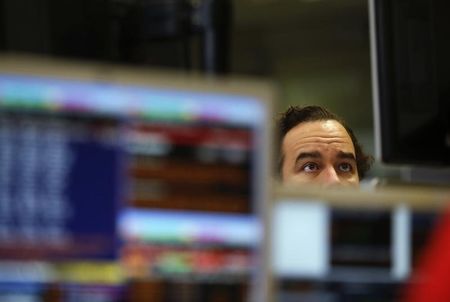
Nasdaq, S&P 500 ride chip-stock wave before Fed verdict; Microsoft slips
By Ankika Biswas and Johann M Cherian
(Reuters) – The Nasdaq and the S&P 500 rose more than 1% each on Wednesday after a bullish forecast from AMD boosted struggling chip stocks, while Microsoft (NASDAQ:MSFT) faltered ahead of an interest-rate decision from the U.S. central bank.
Advanced Micro Devices (NASDAQ:AMD) soared 10.1% after lifting its 2024 forecast for AI-chip sales, spreading the cheer to Nvidia (NASDAQ:NVDA), which rose 10.2%. The broader Philadelphia SE Semiconductor index was up 5.0%.
However, Microsoft lost 1.6% as it plans to spend more this fiscal year to build its AI infrastructure, even as growth in its cloud business slowed – another sign that the payoff from hefty investments in the technology could take longer than hoped.
“AMD’s results pleased investors more than Microsoft’s disappointed, and as a result people are adding to positions in the semiconductor space,” said Sam Stovall, chief investment strategist at CFRA Research.
Other megacaps also rose, with Apple (NASDAQ:AAPL) gaining 0.9%, Meta Platforms (NASDAQ:META) adding 1.5% and Amazon.com (NASDAQ:AMZN) up 2.0% ahead of their quarterly results, due through the week.
At 9:54 a.m. ET, the Dow Jones Industrial Average was down 33.60 points, or 0.08%, at 40,709.73, the S&P 500 was up 65.74 points, or 1.21%, at 5,502.18, and the Nasdaq Composite was up 347.43 points, or 2.03%, at 17,494.85.
The S&P 500 hit a one-week high, with Information Technology stocks leading sectoral gains by 3.0%.
But tech and chip stocks have taken a hit this month, after prompting a record-breaking Wall Street run this year on enthusiasm surrounding AI adoption and the prospect of early rate cuts from the U.S. Federal Reserve.
Results from Alphabet (NASDAQ:GOOGL), Tesla (NASDAQ:TSLA) and Microsoft failed to thrill and investors are moving to underperforming sectors, questioning if the AI-driven rally has run its course.
The small-caps Russell 2000 index and the blue-chip Dow are on track for their best month this year.
On the flip side, the chips index is set for its first monthly decline in three and its worst month since October 2023, while the S&P 500 is on track for a marginal rise, helped by the day’s gains.
Focus will now shift to the Fed’s decision and commentary on interest rates. The central bank is expected to hold rates steady and open the door for a September rate cut.
With traders fully pricing in a cut by September, according to CME’s FedWatch, the fear is that any disappointment on this front could amplify the recent equity selloff.
Fresh employment data showed a lower-than-expected rise in U.S. private payrolls in July, but that is in all likelihood not a true reflection of the labor market, which continues to moderate gradually.
Among others, Boeing (NYSE:BA) climbed 0.3% after naming aerospace industry veteran Kelly Ortberg its new president and CEO.
Mastercard (NYSE:MA) gained 4.2% after the payments giant’s second-quarter profit rose 17%.
Pinterest (NYSE:PINS) slumped 10.1% after forecasting current-quarter revenue below expectations, while Match Group (NASDAQ:MTCH) jumped 11% after a second-quarter revenue beat and a plan to lay off about 6% of its staff.
Advancing issues outnumbered decliners by a 2.21-to-1 ratio on the NYSE, and by a 1.24-to-1 ratio on the Nasdaq.
The S&P index recorded 43 new 52-week highs and one new low, while the Nasdaq recorded 54 new highs and 42 new lows.

